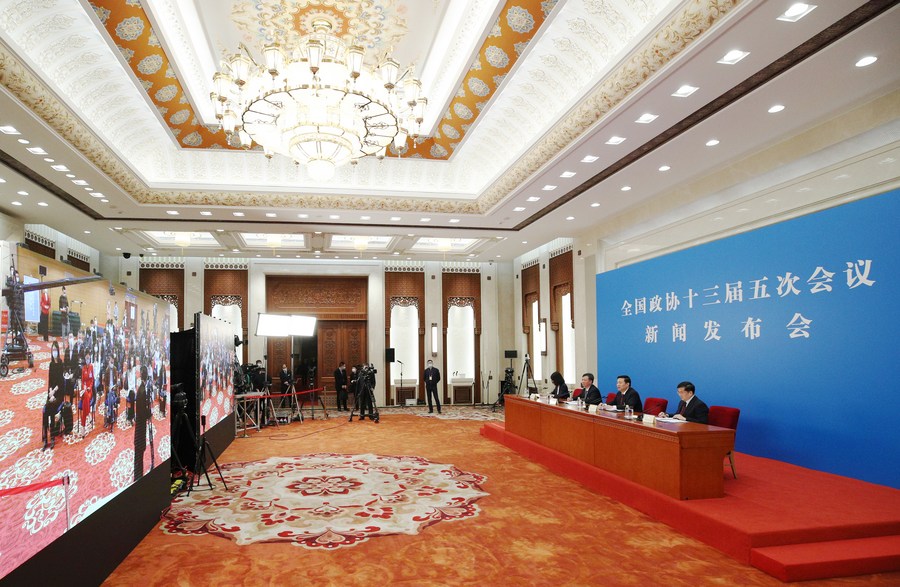Economic fundamentals stay strong
 0 Comment(s)
0 Comment(s) Print
Print E-mail China Daily, March 4, 2022
E-mail China Daily, March 4, 2022

China has the confidence, conditions and capabilities to achieve steady, healthy and sustainable economic development this year, Guo Weimin, spokesman for the fifth session of the 13th National Committee of the Chinese People's Political Consultative Conference, said during a news briefing on Thursday.
Facing the complex and volatile international environment and multiple challenges from the COVID-19 pandemic, China's economy has maintained steady recovery in 2021, suggesting that its economic fundamentals remain strong in the long term, Guo said.
He also warned that the external environment has become more complex and uncertain, saying that China's economy faces severe challenges this year.
Citing comments from members of the 13th National Committee of the CPPCC, Guo said more efforts should be made to maintain steady and healthy economic growth this year, including promoting technological innovation and industrial transformation, expanding domestic demand, strengthening the supply chain, speeding up self-reliance and self-improvement in science and technology, and stabilizing market expectations.
Guo also noted that although foreign trade faces uncertainties and pressure this year, China's trade has solid industrial foundations, and the foreign trade industry has achieved high development in recent years.
More efforts are needed to make use of cross-border e-commerce and other innovative formats to boost foreign trade, actively promote the integration of domestic and foreign trade and boost the digitization level of trade, Guo added.
He said the country will take practical steps this year to continuously expand high-level opening-up and build an open world economy.
Data from the National Bureau of Statistics showed that the official purchasing managers index for China's manufacturing sector came in at 50.2 in February versus 50.1 in January, staying in expansion territory for four months despite downward pressure and uncertainties. A PMI reading above 50 indicates the economy is expanding.
Yang Jinghao, chief economist at Concat Data Technology (Hangzhou) Co, said the accelerated manufacturing activity in February points to the resilience of China's economy and shows that the nation has taken proper measures to deal with the downward pressure.
Despite facing multiple pressures from shrinking demand, supply shock and weakening expectations, China's economy enjoys strong resilience with positive fundamentals remaining, Wang Yiming, a senior economist and a member of the 13th National Committee of the CPPCC, said at a recent news conference.
Wang said China's economy may face greater downward pressure in the second quarter, adding that he expected the government to take more steps to shore up growth.
He said the government needs to be prudent in mapping out policies with contractionary effects, and more efforts should be made to expand domestic demand, strengthen industrial and supply chains and guard against and defuse major risks.
Tommy Wu, lead economist at the think tank Oxford Economics, said he expected front-loaded policy support and more policy easing to support growth.
"We forecast GDP growth will slow to 5 percent this year, before a pickup to 5.5 percent in 2023," he said.
According to Wu, the government has continued to emphasize tax cuts and unemployment benefits to support the economy and has sped up the approval of infrastructure projects. In addition, local governments' bond issuance for infrastructure financing has also gained pace.
"We look for further reduction in the reserve requirement ratio and loan prime rate to support growth," he added.





